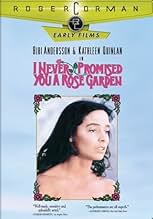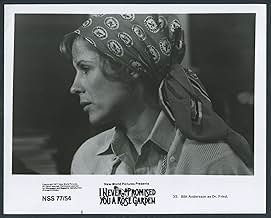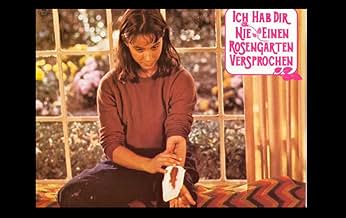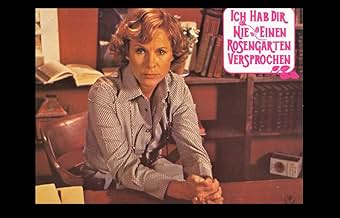Jamais je ne t'ai promis un jardin de roses
Original title: I Never Promised You a Rose Garden
IMDb RATING
6.4/10
1.7K
YOUR RATING
A disturbed, institutionalized 16-year-old girl struggles between fantasy and reality.A disturbed, institutionalized 16-year-old girl struggles between fantasy and reality.A disturbed, institutionalized 16-year-old girl struggles between fantasy and reality.
- Director
- Writers
- Stars
- Nominated for 1 Oscar
- 4 nominations total
Karin Collison
- Nurse
- (as Elizabeth Dartmoor)
Barbara Steele
- Idat
- (scenes deleted)
- Director
- Writers
- All cast & crew
- Production, box office & more at IMDbPro
Featured reviews
Deborah Blake (Kathleen Quinlan) is admitted to a country institution by her high street parents, unable to cope with the ignominy brought upon them, by her erratic, anti-social behaviour.
Taunted by her inner-demons (to which we're treated inventively from the mind's eye perspective), she's gradually cajoled from her psychosis by the unassuming, yet fiercely determined treating doctor - Bibi Andersson delivering a warm, sympathetic performance and headlining an impressive female cast that includes Signe Hasso, Susan Tyrrell, Diane Varsi, Silvia Sidney, screenwriter /actress Darlene Craviotto and taking a short break from her maternal duties on Martha's Vineyard, Lorraine Gary.
Along the journey, there's a couple of plot diversions, some poignant, others hackneyed and exploitative, but then would New World Pictures ever have distributed this movie without a stereotypical bully nurse scenario? Unlikely.
The Roger Corman production combines cinematic liberties with an at-times reverent translation of the Hannah Green novel, creating a compelling B-movie possessing an unusual dramatic-fantasy film tone. A cynical viewer might postulate that Corman saw a payday following the success of "One Flew Over the Cukoo's Nest", and to a large extent, this remains exploitative cinema. That said, Quinlan's performance clearly defies that brand, her characterisation personifies trauma and whilst often intense, isn't overcooked.
You have to commend New World Pictures for taking the plunge with this release against type, especially when you consider the other titles in their production line and catalogue at the time; 'Rose Garden' is a very different breed to your typical locally made New World Picture. Not perfect by any means and does have a tendency to stigmatise the subject matter, nevertheless an enjoyable film in spite of its flaws.
Taunted by her inner-demons (to which we're treated inventively from the mind's eye perspective), she's gradually cajoled from her psychosis by the unassuming, yet fiercely determined treating doctor - Bibi Andersson delivering a warm, sympathetic performance and headlining an impressive female cast that includes Signe Hasso, Susan Tyrrell, Diane Varsi, Silvia Sidney, screenwriter /actress Darlene Craviotto and taking a short break from her maternal duties on Martha's Vineyard, Lorraine Gary.
Along the journey, there's a couple of plot diversions, some poignant, others hackneyed and exploitative, but then would New World Pictures ever have distributed this movie without a stereotypical bully nurse scenario? Unlikely.
The Roger Corman production combines cinematic liberties with an at-times reverent translation of the Hannah Green novel, creating a compelling B-movie possessing an unusual dramatic-fantasy film tone. A cynical viewer might postulate that Corman saw a payday following the success of "One Flew Over the Cukoo's Nest", and to a large extent, this remains exploitative cinema. That said, Quinlan's performance clearly defies that brand, her characterisation personifies trauma and whilst often intense, isn't overcooked.
You have to commend New World Pictures for taking the plunge with this release against type, especially when you consider the other titles in their production line and catalogue at the time; 'Rose Garden' is a very different breed to your typical locally made New World Picture. Not perfect by any means and does have a tendency to stigmatise the subject matter, nevertheless an enjoyable film in spite of its flaws.
Hannah Green's popular book has become first-rate medical drama despite echoes of other hospital horror shows (which are probably unavoidable) and many disturbing, alarming episodes which cause a general lack of relief to be intensely felt. Kathleen Quinlan is remarkable in a unheralded tour-de-force playing schizophrenic, suicidal young woman admitted into a mental institution by her parents. Quinlan's Deborah Blake is not an innocent lamb being tossed to the lions--she's as deeply troubled and psychotic as the other inmates--yet her doctor (a warm, compassionate Bibi Andersson) detects a core of sound reasoning to Deborah's manner, and works carefully on rescuing the girl from the demons who plague her. Deborah's fantasy world, which takes place in what appears to be a prehistoric civilization of Indian mystics, seems wildly overwrought at first (and we never do uncover the connection between Deborah and these tribal warriors and lovers); however the structure of the film is quite linear and, as we move from one chapter to the next, we can sense what drives this girl to self-destruction without a lot of technical jargon. Supporting cast is also strong, particularly Norman Alden as a kind orderly and Martine Bartlett (who played the mother in "Sybil") as a resident hysteric. Sylvia Sidney, as a returning patient who didn't make it on the outside, is typically a wonderful performer, yet she's never quite convincing in this part; her trained, poised style of acting tends to clash with the unbridled crazies who wander up and down the halls. Also, there's a small leap forward in time near the end which is momentarily confusing--perhaps another sequence with Andersson might have helped to prepare viewers for Blake's tentative recovery. Otherwise, a gut-wrenching achievement: unblinking, hard to watch on occasion, but undeniably potent and well-made. *** from ****
This isn't a film that always works, but when it does, it finds its way so deep under your skin that the pain is surprising. The acting is what stands above everything else here. I suppose I'd seen Kathleen Quinlan before, but I can't say I've ever really noticed her. Maybe it's because she's so young, so human here that it stands out amongst everything else she did before and after this. Her performance is wild, heartbreaking, intensely realized. Other performances, like Bibi Andersson, are great, but not as essential as Quinlan.
This is ground that has been covered with perhaps more consistency (in a cinematic sense) with films like "Girl, Interrupted" but never with the same emotional depth as here. Anthony Page makes a lot of strange, even bad directorial decisions perhaps, but he captures a crazed, uneasy tone in the cinematography and performances that brings it all together. The only odd points are the off-center dreams/hallucination sequences and out-of-place soundtrack. If you can overlook these, this is a truly great film. It really tore my heart out.
This is ground that has been covered with perhaps more consistency (in a cinematic sense) with films like "Girl, Interrupted" but never with the same emotional depth as here. Anthony Page makes a lot of strange, even bad directorial decisions perhaps, but he captures a crazed, uneasy tone in the cinematography and performances that brings it all together. The only odd points are the off-center dreams/hallucination sequences and out-of-place soundtrack. If you can overlook these, this is a truly great film. It really tore my heart out.
This is a film which came too late.Anybody who sees it is going to compare it to Anatole Litvak's "the snake pit" (1948).But that was then and this is now and the evolution is barely discernible.If "snake pit" was (unfairly) dismissed as obsolete,what can we say of a movie which was produced thirty years later and (roughly) depicts the same milieu? The most interesting thing in that average-to-good foray into psychiatry is its cast.Bergmanian Bibi Anderson is ideally cast as the shrink who tells the disappointed heroine "I've never promised you a rose garden".But there are also former glories such as Signe Hasso and Sylvia Sydney and future stars (Dennis Quaid).
But there is still a very interesting movie in here with a number of memorable sequences.
The movie is about our protagonist, who to our understanding, is a teenaged girl, who apparently either hallucinates about some bizarre fantasy world (and not in a fun Terry Gilliam way but a seriously bizarre "why would she even consider this superior way?") or merely is in fantasy about it in escaping from reality, it's not explained. It begins as she goes to a mental hospital in the countryside it looks and almost immediately our main character inexplicably stabs herself and gets thrown in a disturbed section as opposed to the initial summer camp section. It is here, where our story follows the rest of the film, a series of up and down spirals and looks at her interactions with the other patients.
The thing about all of this is we never actually get to understand the characters at all. We are never told what they're about, why they feel this way, what their backgrounds are, and why they do what they what they do. They just are, and throughout the whole piece the audience feels like with any of the characters, it never surpasses the point of acquaintment because even, if the characters be developed, they were never characterized in the first place, so it's irrelevant. At the same time, though the movie certainly to its benefit explores the setting and situation in a very visceral way, by the movie's end, everything feels oversaturated, because it feels as though we have spent such time in this setting watching similar things with people that don't really mean much for so long that it just starts to wear thin. When the film end, we aren't really sure why the events have turned out as they did, because we aren't really sure why they were the other way in the first place. It just feels like a breath of fresh air to get a new sense of scenery.
The thing is, though, despite that, the movie is still successful probably because the happenings themselves are rather interesting, the unflinching portrayal has the power to captivate, and there is claustrophobic intensity to the asylum as well as a general heterosexual male (being the viewer) to recessive female women appeal, which really adds a type of close-knit feel with the characters.
So, it's not the most satisfying nor the most well-devised film of its genre out there, but if you be a fan of asylum films, this is definitely worth checking out. I also must note that out of all the mental hospital films out there, this is probably the most intense. This movie is 100% serious and very frightening and unsettling. There's no comedy nor light-heart in this movie. The tone is closer to a horror film (despite that it is a pure dramatic realism) than it is to One Flew Over the Cuckoo's Nest. From that perspective this film is actually very unique.
The movie is about our protagonist, who to our understanding, is a teenaged girl, who apparently either hallucinates about some bizarre fantasy world (and not in a fun Terry Gilliam way but a seriously bizarre "why would she even consider this superior way?") or merely is in fantasy about it in escaping from reality, it's not explained. It begins as she goes to a mental hospital in the countryside it looks and almost immediately our main character inexplicably stabs herself and gets thrown in a disturbed section as opposed to the initial summer camp section. It is here, where our story follows the rest of the film, a series of up and down spirals and looks at her interactions with the other patients.
The thing about all of this is we never actually get to understand the characters at all. We are never told what they're about, why they feel this way, what their backgrounds are, and why they do what they what they do. They just are, and throughout the whole piece the audience feels like with any of the characters, it never surpasses the point of acquaintment because even, if the characters be developed, they were never characterized in the first place, so it's irrelevant. At the same time, though the movie certainly to its benefit explores the setting and situation in a very visceral way, by the movie's end, everything feels oversaturated, because it feels as though we have spent such time in this setting watching similar things with people that don't really mean much for so long that it just starts to wear thin. When the film end, we aren't really sure why the events have turned out as they did, because we aren't really sure why they were the other way in the first place. It just feels like a breath of fresh air to get a new sense of scenery.
The thing is, though, despite that, the movie is still successful probably because the happenings themselves are rather interesting, the unflinching portrayal has the power to captivate, and there is claustrophobic intensity to the asylum as well as a general heterosexual male (being the viewer) to recessive female women appeal, which really adds a type of close-knit feel with the characters.
So, it's not the most satisfying nor the most well-devised film of its genre out there, but if you be a fan of asylum films, this is definitely worth checking out. I also must note that out of all the mental hospital films out there, this is probably the most intense. This movie is 100% serious and very frightening and unsettling. There's no comedy nor light-heart in this movie. The tone is closer to a horror film (despite that it is a pure dramatic realism) than it is to One Flew Over the Cuckoo's Nest. From that perspective this film is actually very unique.
Did you know
- TriviaThe lead female role of of Deborah Blake in this picture was previously intended for Natalie Wood who had unrealized plans to both produce and star in the movie. Wood once had planned to produce the picture as well as star in it in the role of Deborah Blake but those plans never materialized. The part in the end was played in the film by Kathleen Quinlan.
- GoofsIn the New Year's Eve party scene, Deborah is seen with loose hair talking to Dr. Fried and then there is a close-up of Deborah with her hair pulled back from her forehead.
- Quotes
Deborah Blake: You can turn me off, you know. You can go off with your friends and write another paper on schizophrenia and get an award for it. But I can't turn me off. So I'm calling off the fight.
Dr. Fried: So you quit. Stay in the nuthouse for the rest of your life.
- How long is I Never Promised You a Rose Garden?Powered by Alexa
Details
- Release date
- Country of origin
- Official site
- Language
- Also known as
- I Never Promised You a Rose Garden
- Production companies
- See more company credits at IMDbPro
Contribute to this page
Suggest an edit or add missing content


























